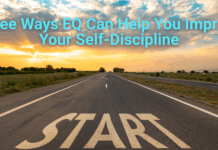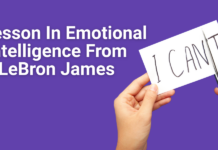
What are the seven triggers for capturing attention?
Holding someone’s attention can be useful in multiple of ways. From work presentations, to writing articles, to job interviews, being able to hold the center of your audience’s focus is immeasurably useful. But how should we approach attention? And what are the key steps to retaining it?
Ben Parr is an award-winning journalist, speaker, investor and entrepreneur. He was named a Forbes 30 under 30 list of high achievers. His bestselling book is Captivology: The Science of Capturing People's Attention. I recently interviewed Ben for the LEADx podcast to find out how we can all benefit from finding ways to capture and keep attention. (The interview below has been edited for space and clarity.)
Kevin Kruse: You say there are three types of attention. What are the three types, and why is that important to understand?
Ben Parr: All right, so there are three stages of attention. You have to think of attention as a gradual process. It's like a bonfire. You don't start with a bonfire, you start with a spark or an ignition, and then you grow into the kindling, and then you build up the fire to that big bonfire, so it's three stages. Same thing with attention. First stage is immediate attention. It is our subconscious automatic response to certain sounds and stimuli. It's if you duck automatically when you hear a gunshot, or you turn away when you have a bad spell. It's designed to protect us; it's controlled by a system called ‘sensory memory.’ There are a lot of things you could actually do with that at a subconscious level people don't know about. The second stage of attention is short attention or our short-term conscious attention when we switch to like paying attention to a TV show, a speech, a book, a podcast.
It's controlled by a system called ‘working memory,’ and that is the short-term attention and memory process that helps us decide which information to pay attention to, but more importantly, which information gets stored into long-term memory. One keynote about attention is that attention and memory are intrinsically linked. If somebody does not remember what you said, they did not pay attention. Your goal is to create memory.
The last stage is ‘long attention’ and long attention is that long-term kind of interest that somebody has. I like to say it's the difference between trying to sell your product everywhere as a startup, and being Apple, where everybody just lines up when you announce a product because you built so much loyalty, audience and reputation. That's long attention. That's long-term interest, long-term memory. That's what you want to get to, so you go through the three stages to reach that.
Kruse: Can you summarize or touch on what the ‘captivation triggers’ are?
Parr: The seven triggers are as follows, and I'll give you very short descriptions of each. They are ‘automaticity,’ ‘framing,’ ‘disruption,’ ‘reward,’ ‘reputation,’ ‘mystery’ and ‘acknowledgement.’ They kind of go in the order of immediate to long-term attention. ‘Automaticity’ is capturing attention with automatic sensations. It's like how a brighter color captivates our attention more often than a darker color at a subconscious level. Also, that we see red as a color of love, and thus we will look at somebody more often if they're wearing red than other colors. There's a lot of interesting science to this.
‘Framing’ is the fact that we pay attention to things that fall within our frame of reference and tend to ignore things that fall outside of it. Politics is a perfect example. If you're a republican or you're a democratic, you will pay attention to certain things and ignore others purely on the basis of that.
‘Disruption’ is the fact that we pay attention to things that violate our expectations of the world. If a clown comes into the middle of your office, you're going to pay attention, because that violates what you expect the world to be like.
‘Reward’ is the fact that we pay attention to things that provide us with short-term and long-term rewards. Whether that is food, and money, and sex, to validation, and self-healing, and all of these other longer-term things like having a purpose in your career.
The ‘reputation’ trigger is the fact that we pay attention to repeatable sources of information, most specifically experts and the power experts have on our attention.
‘Mystery’ is the fact that we pay attention to mysteries and stories that are incomplete and there's a whole ton of amazing science around why mysteries captivate our attention and how to build a great mystery.
The final trigger, ‘acknowledgement,’ is the fact that we pay attention to people and things that validate us and provide us with empathy and understanding. It's that kind of difference where if somebody you care about or even a brand you care about provides you with validation. It could be your boss, it could be an employee, it could be your wife or your husband that builds the deepest kind of attention.
Kruse: Some say attention is the biggest variable, that it’s almost impossible not to be persuaded if someone keeps your attention. Would you agree with that?
Parr: For the most part. I like to say attention is the currency of the modern economy. There is nothing you can do if you don't have somebody’s attention. Nothing can be accomplished. Attention is at the very minimum the baseline for everything that you do. If you don't have the attention of students, they can't learn. If you don't have the attention of customers, they won't buy.
Now, in general if you have their attention, you have more ability to persuade, but one thing that people sometimes do and don't realize is that attention, by any means, does not necessarily lead to conversions. Like shock jocks, or shocking the world. This is the ‘disruption’ trigger. You can walk into an office wearing nothing but a speedo for your job interview and you're going to get attention, but you're not going to get the job because you did not have a disruption that aligned with the values that you wanted the other person to be persuaded by. You want to have a way of capturing their attention, but still be professional. As an example, if you're trying to capture their attention doing an interview. Just trying to capture attention period doesn't always work, it has to be tactically correct.
Kruse: There’s a lot of click-bait headlines, tweets, and articles out there. What's a young writer to do to break through in this kind of noisy world?
Parr: It's absolutely becoming more and more of that and I feel like, don't focus too much on the short-term of like, “Do I get a ton of clicks with this immediate article?” The big question, how do you become an expert in your area? The best writers consistently make content, whether it gets a million clicks or seven clicks and they put it out consistently in their key area and they get known for their expertise, and they get called for their expertise, and they get book deals, and they get consulting deals, and they get new jobs.
Build your expertise, pick an area that you really want to dive into deeper, that you really enjoy, that you really care about, that you think could be marketable too, and just make a lot of really compelling content, and just write interesting things. You'll learn sometimes that some headlines work better than others, but really in the end it's how compelling is your content and how much does that align with your goal of building up to expertise. Again, ‘reputation’ trigger. We pay attention to experts; we pay deference to experts. How do you get to that level?
Kruse: One last example. Joe or Jane office worker, mid-career professional, what should he or she be doing to build their brand? How can they use these triggers to get ahead, career-wise?
Parr: I actually wrote about this when I first came out with the book in the Harvard Business Review. There are a couple of things you have to think about, and it really kind of depends. You have to understand who you're trying to get the attention of. Are you trying to get the attention of your industry? Are you trying to get the attention of your teammates and employees? Are you trying to get the attention of your customers? Those are different groups and you have to understand who you're trying to capture the attention of. Now again, we've already covered one of them, which is building up expertise. Helps you capture attention across all the groups. If you're considered the expert in a key area, you become far more valuable in your career and your value to other companies increases exponentially, and it's harder for a company to fire you when you're the expert.
The second thing I would say is you got to really find a way to reward people, whether it's your audience, or your teammates, and using the reward trigger you can understand the dynamics of both what I call, immediate or short-term rewards like bonuses and more visceral things, and intrinsic style rewards, which are things like being able to provide a purpose to your team, or provide a sense of satisfaction to your audience for growing up with you and feeling like they have some kind of ownership in your success. These are probably some of those key things. Then I would also say the acknowledgement trigger and building that deeper relationship with… It again depends on are you trying to get the attention of your bosses, or your audience.
Kruse: Validation is going to be a big trigger.
Parr: Absolutely. If your boss feels like they're mentoring you and they feel like they have an even more vested interest, they're going to have a vested interest in making sure your career goes. On the other hand, if you become an expert to the general public, you also become an invaluable asset. There are a couple different ways to reach this professional level, you just got to know who your audience is.
Kruse: I always like to challenge our listeners to get at least 1% better every single day. Is there something you could challenge us to do today?
Parr: I'm going to give you two challenges. Challenge number one is I'm an Eagle Scout and so I always do this, which is do a ‘good turn’ daily. Do one nice thing for one person that you do not know at one random time and think about that daily. You will make the world 1% better every single day.
The second one is I challenge you to listen to some kind of new piece of information everyday. It could be an audiobook, it could be 60dB.com where they have a bunch of great informational content, it could be anything, Anchor, it could be NPR, but listen to something that will educate you. It could be a YouTube video. Learn something new every day from one of those content channels. Decrease the amount of time you're spending watching filler content and increase the amount of content that educates you on something you don't know.
—
Kevin Kruse is a New York Times bestselling author, host of the popular LEADx Leadership Podcast, and the CEO/Founder of LEADx.org, which provides free world-class leadership training, professional development and career advice for anyone, anywhere.





